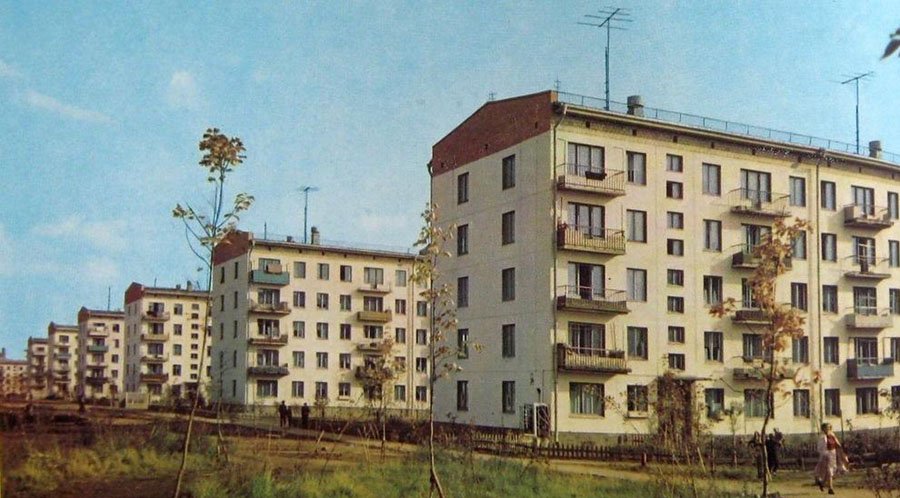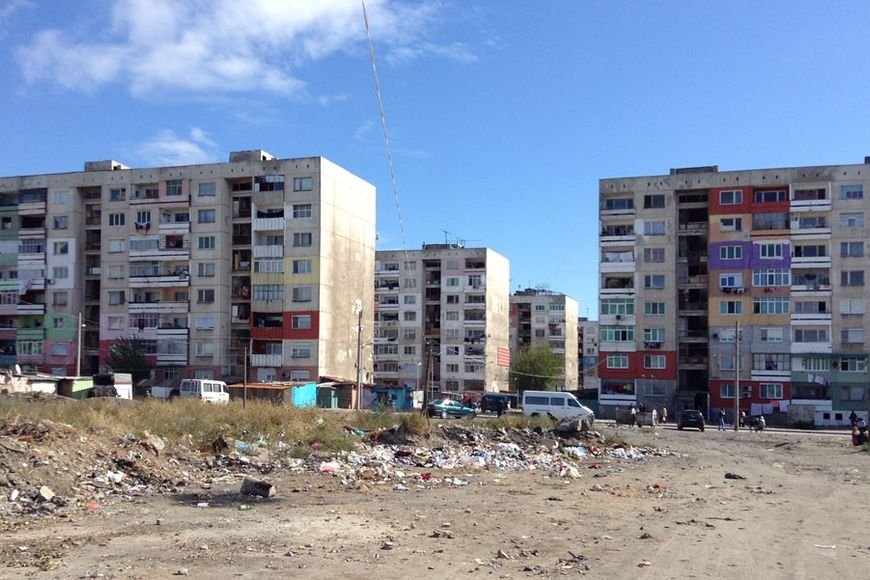Part 1
Part 2
Living Conditions
Compared to the cost of living in the West, my parents paid very little for the accommodation, maybe 1/20 of their combined monthly income. At the same time, securing a decent place to live was a problem. It was the time after WWII when many buildings in the country were destroyed by Nazi bombing.
When I was little, I recall our family living in a house of an army barrack type. The apartment had several rooms, and each room was populated by a different family using a common kitchen and toilet. The apartment had no shower and once a week we went to a public bathhouse.
Three of us lived in a room approximately 75 square feet. There was a place to put a bed where my parents slept and a small table. The room was warmed up by a wood furnace, which looked somewhat like on the picture below, but much smaller.

That’s where I slept at night.
I think I was about five years old when a strange man entered our small room. As my mom explained it to me later, her eyes rolled came out from their orbits and her throat got dry. It was as if a ghost of her recently passed away father entered the room.
However, when a man opened his mouth and started speaking in broken Russian, everything fell into place. It was my mom’s uncle Abe, who came from America to visit. When he looked at our accommodation he said “Even blacks in America don’t live like this!” and then added “I will beat you up! Aahahaha…” That was his joke that he repeated constantly.
He was a loud, rude, and vulgar man, but at the same time, in his way, kind and generous. The next year he brought with him several suitcases filled with clothes and footwear. Now I understand that he bought all this in the second-hand store. For us, though this was such a blessing. “This is not a new item but of good quality!” he repeated when we tried it on.
I still felt offended.
Who could he say these words about our country, the best country in the world where children have the happiest childhood?! However, I still ate a huge chocolate bar with nuts that he gave me.
“You like American chocolate, huh?” he laughed and then added, “I will beat you up! Ahahahahaha”.
When Nikita Khrushchev became the General Secretary of the communist party he started to build simple housing. This was a big step forward. People call them “Khrushchevky.” They looked like this

Recently I watched a French movie that showed poor areas where immigrants from Africa lived and told myself. “Oh, they look just like Khrushchevky!”

Nevertheless, to have your own apartment with your own kitchen, bathroom, shower and even a bathtub was a big thing those days. People couldn’t just go and buy themselves an apartment even if they had the money.
Apartments were distributed by the government and everybody had to stay in line to obtain them.
I remember that day (I was about six at the time) when we moved into a new apartment. This was so exciting! At first, I was disappointed as when we got in as the place seemed even smaller than the room where we lived. Though as it turned out, it was only an entrance hallway and when we opened the door to the room, I was amazed at its size. The apartment had two rooms that we would call a one-bedroom apartment here and it had a balcony. So my parents and I lived in a large room (about 12 by 18 feet) while my grandma lived in a small one.
These projects were built on the outskirts of Moscow to situate workers from large factories.
Each factory had the list of applicants and apartments were given based on the principle first come first serve. On paper that is. In reality, the placement was in hands of the bureaucrats, and, like everybody else, they had human weaknesses, including susceptibility to bribery.
However, bribery wasn’t the only way to cut the line. Otherwise, how could my family that was barely making ends meet, afford the bribe? Simply put we were able to cut the line by taking advantage of the dominant narrative.
Let me explain. I’ve already said that all people in socialistic organizations were compensated more or less similarly. Being lazy, incapable or drunkard was not a sufficient reason for the firing. Instead, people like this were subjected to public condemnation. Each factory and even a large workshop had their own local wall newspaper that praised leaders of production and condemned those offenders of socialistic ethics. The newspaper was made on a large sheet of Whatman paper and contained articles, pictures, and drawings of local heroes and caricatures of poorly performing workers, dгunkards, or people who committed some other transgressions like participation in a brawl or spousal infidelity.

The task of making a wall newspaper could loosely equate to civic duty, community service, or social work. A certain level of communal activity on the grass-root level was expected from any organization and there were people assigned to this type of task. However, since making such a creation required certain artistic skills, which people usually didn’t have, the administration quietly hired some artists on the side. This type of work could be compensated financially or bartered for favors. Thus my mother, who was a graphic artist, instead of payment, was offered a possibility to cut the waiting line for a new apartment. We were injected into a list for workers from the large Moscow factory that produced heavy machinery.

